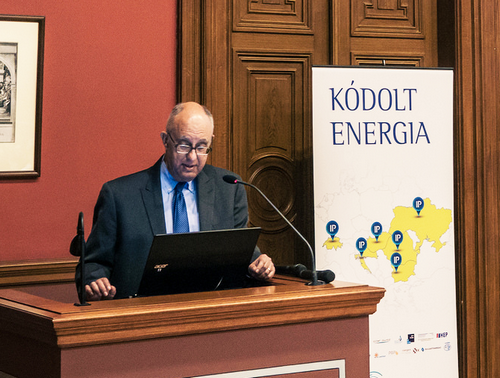“I owe my soul to the company store...” – Jeffrey Pfeffer, recipient of the Herbert Simon Award of the Rajk László College for Advanced Studies in 2016

In 2016, the students of the Rajk László College for Advanced Studies conferred the Herbert Simon Award on Jeffrey Pfeffer professor of Stanford University,. Pfeffer is a behavioural scientist, primarily specialized in organizational power, management styles and work-related stress. He is one of the most influential contemporary thinkers in the field of management. On 22 May 2017, Professor Pfeffer received the Herbert Simon Award in the ceremonial hall of the Hungarian Academy of Sciences, and then gave a ceremonial lecture entitled Dying For a Paycheck: The Workplace and Human Sustainability.
The Herbert Simon Award was founded in 2004 by students of the Rajk László College for Advanced Studies. With the award, members of the College honour theoretical experts who contribute greatly to the solution of business problems and inspire the college members’ thinking and professional development. The Award, granted annually, attracts renowned researchers and professors of foreign business schools to Hungary. The previous winner, Eric Brynjolfsson, professor of MIT, received the Award of 2015.
Professor Pfeffer investigates the correlations between management styles and healthcare expenses resulting from work-related stress, illnesses or fatalities. In cooperation with his colleagues, he conducted meta-analyses of certain workplace factors and documented their negative effects on health. He and his colleagues found that numerous work-related habits – such as long working hours, the conflict between professional and private life, financial uncertainty resulting from unpredictable working hours and dismissals, the lack of control over one’s scope of responsibilities or the lack of social support – have just as negative effects on health as passive smoking does. As evidenced by their research, approximately 120,000 fatalities and a healthcare expenditure of USD 180 billion are directly linked to inadequate work-related habits in the United States. This puts inadequate working environment on the fifth place on the list of the most common causes of death.
Recent years have seen a growing emphasis on environmental sustainability and the measurement of the companies CO2 emissions or recycling activities, yet little attention has been paid to human sustainability and its consequences on management practices. Professor Pfeffer says that we should be concerned about humans just as much as we are concerned about polar bears or endangered species, and state regulators should ensure the heightened protection of human life not only at the beginning and at the end of life, but also during the decades in between. The situation is quite complex. Paradoxically, technological development has not decreased, but on the contrary increased the pressure on human workforce. Companies increasingly make the deliberate decision to employ fewer people than required. In addition, being busy has become a sign of a high socio-economic status. While in the 1920s and 1930s, suntanned skin was a sign of wealth and esteem, nowadays the sense of indispensability, coupled with a continuously ringing mobile phone, conveys the same message.
Moreover, as evidenced by Professor Pfeffer’s research, there are huge differences in the life expectancy of citizens of various countries or members of various social groups. The difference is 48 years between Japan and Sierra Leone. Within the United States, the difference is approximately 30 years, depending on the individual’s level of qualification. According to Professor Pfeffer, this problem is to be dealt with in the same way as environmental pollution is combated: state regulations are needed, irresponsible employers need to be named and shamed, and incumbent and future leaders need to be convinced. The Professor is optimistic. He says that as a rule society pays attention to people who know how to elimimate a leading cause of death.
Máté Baksa
